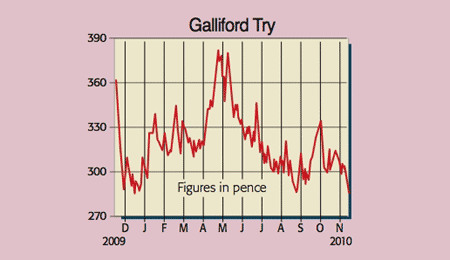Get the latest financial news, insights and expert analysis from our award-winning MoneyWeek team, to help you understand what really matters when it comes to your finances.
You are now subscribed
Your newsletter sign-up was successful
Want to add more newsletters?

Twice daily
MoneyWeek
Get the latest financial news, insights and expert analysis from our award-winning MoneyWeek team, to help you understand what really matters when it comes to your finances.

Four times a week
Look After My Bills
Sign up to our free money-saving newsletter, filled with the latest news and expert advice to help you find the best tips and deals for managing your bills. Start saving today!
Is Mervyn King about to ride to the rescue of British house-builders? Last week the Centre for Economics and Business Research predicted that property prices would rise in nominal terms by 2.2% in 2011 and then by 5% a year thereafter. That's thanks to the Bank of England's incredibly accommodative stance on interest rates and quantitative easing (QE).
This contrarian view was also reciprocated by the Council of Mortgage Lenders last Friday, when it said that buy-to-let lending had increased 12% in the third quarter of 2010. Meanwhile, there is even a chance that in diversifying away from the greenback, some dollar-loaded sovereign wealth funds may begin snapping up physical assets, such as British property.
This is where UK contractor, Galliford Try, comes in. The company's housing arm specialises in constructing social and residential properties. Indeed, Galliford Try has amassed a land-bank of 9,600 plots (worth about £490m), which it plans to develop over the next few years. However, the jewel in the firm's crown is its civil engineering division, Morrison construction the number-one player in water infrastructure.
MoneyWeek
Subscribe to MoneyWeek today and get your first six magazine issues absolutely FREE

Sign up to Money Morning
Don't miss the latest investment and personal finances news, market analysis, plus money-saving tips with our free twice-daily newsletter
Don't miss the latest investment and personal finances news, market analysis, plus money-saving tips with our free twice-daily newsletter
Gamble of the week: Galliford Try (LSE: GFRD)

At the last count, Morrison had a chunky £1.75bn order book, providing cover for 91% of its targeted revenues for the year ending June 2011 (55% for 2012). The sector split for the backlog is 41% regulated (ie, water), 49% public and 10% private. Furthermore, this unit has won several prestigious new contracts over the past three months, including work within the water, education, healthcare, and hotel industries.
Financially, the group is in fine fettle too. Net funds of £76.5m (excluding a £17m pension deficit), are equivalent to 92p per share. House broker KBC Peel Hunt is anticipating 2010 sales and underlying EBITDA of £1.2bn and £34.3m respectively after stripping out the distorting effect of the cash pile, which puts the stock on a miserly enterprise value to EBITDA multiple of less than six. That's far too cheap for a such a high-quality asset, paying a 3.5% dividend yield and with net tangible assets (NTA) worth 368p per share.
So what should you watch out for? One of the biggest worries is the property sector taking another lurch south. That would hurt profits. However, with the shares trading at a 20% discount to NTA, there's plenty of slack built into the price. The firm is also exposed to the usual risks associated with managing long-term contracts and coping with the government's austerity measures.
In short, Galliford is a cheap inflationary hedge for the more adventurous investor.
Recommendation: SPECULATIVE BUY at 280p
Get the latest financial news, insights and expert analysis from our award-winning MoneyWeek team, to help you understand what really matters when it comes to your finances.
Paul gained a degree in electrical engineering and went on to qualify as a chartered management accountant. He has extensive corporate finance and investment experience and is a member of the Securities Institute.
Over the past 16 years Paul has held top-level financial management and M&A roles for blue-chip companies such as O2, GKN and Unilever. He is now director of his own capital investment and consultancy firm, PMH Capital Limited.
Paul is an expert at analysing companies in new, fast-growing markets, and is an extremely shrewd stock-picker.
-
 Early signs of the AI apocalypse?
Early signs of the AI apocalypse?Uncertainty is rife as investors question what the impact of AI will be.
-
 Reach for the stars to boost Britain's space industry
Reach for the stars to boost Britain's space industryopinion We can’t afford to neglect Britain's space industry. Unfortunately, the government is taking completely the wrong approach, says Matthew Lynn